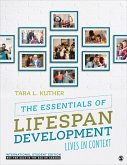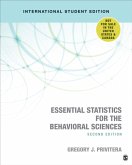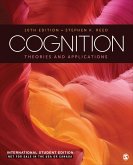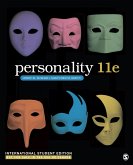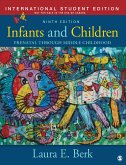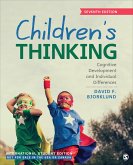- Audio CD mit DVD
- Merkliste
- Auf die Merkliste
- Bewerten Bewerten
- Teilen
- Produkt teilen
- Produkterinnerung
- Produkterinnerung
Integrating current research findings with foundational, classic theory and research, the second edition presents a comprehensive yet concise introduction to the field, exploring the diverse contexts that shape human development, including gender, race and ethnicity and socioeconomic status,. The text is organized around overviews brought to life in Dr. Kuther s Chalk Talks, a series of whiteboard-style animations that feature brief, captivating videos. Lively feature boxes and critical thinking questions encourage students to compare concepts, apply theoretical perspectives, and consider…mehr
Andere Kunden interessierten sich auch für
![The Essentials of Lifespan Development - International Student Edition The Essentials of Lifespan Development - International Student Edition]() Tara L. KutherThe Essentials of Lifespan Development - International Student Edition96,99 €
Tara L. KutherThe Essentials of Lifespan Development - International Student Edition96,99 €![Psychology - International Student Edition Psychology - International Student Edition]() James S. NairnePsychology - International Student Edition119,99 €
James S. NairnePsychology - International Student Edition119,99 €![Essential Statistics for the Behavioral Sciences - International Student Edition Essential Statistics for the Behavioral Sciences - International Student Edition]() Gregory J. PriviteraEssential Statistics for the Behavioral Sciences - International Student Edition127,99 €
Gregory J. PriviteraEssential Statistics for the Behavioral Sciences - International Student Edition127,99 €![Cognition - International Student Edition Cognition - International Student Edition]() Stephen K. ReedCognition - International Student Edition151,99 €
Stephen K. ReedCognition - International Student Edition151,99 €![Personality - International Student Edition Personality - International Student Edition]() Jerry M. BurgerPersonality - International Student Edition107,99 €
Jerry M. BurgerPersonality - International Student Edition107,99 €![Infants and Children - International Student Edition Infants and Children - International Student Edition]() Laura E. BerkInfants and Children - International Student Edition130,99 €
Laura E. BerkInfants and Children - International Student Edition130,99 €![Children's Thinking - International Student Edition Children's Thinking - International Student Edition]() David F. BjorklundChildren's Thinking - International Student Edition127,99 €
David F. BjorklundChildren's Thinking - International Student Edition127,99 €-
-
Integrating current research findings with foundational, classic theory and research, the second edition presents a comprehensive yet concise introduction to the field, exploring the diverse contexts that shape human development, including gender, race and ethnicity and socioeconomic status,. The text is organized around overviews brought to life in Dr. Kuther s Chalk Talks, a series of whiteboard-style animations that feature brief, captivating videos. Lively feature boxes and critical thinking questions encourage students to compare concepts, apply theoretical perspectives, and consider applications of research findings in their own lives and future careers.
The new edition features:
A streamlined organization for improved readability while retaining and enhancing coverage of major findings in developmental science New and current research reflecting over 1,400 references published since 2016, including nearly 900 published in 2017 and 2018, in addition to discussions of classic research A new chapter on death and dying (Chapter 19) covering the processes of death, how children and adults understand death, and coping with bereavement
The new edition features:
A streamlined organization for improved readability while retaining and enhancing coverage of major findings in developmental science New and current research reflecting over 1,400 references published since 2016, including nearly 900 published in 2017 and 2018, in addition to discussions of classic research A new chapter on death and dying (Chapter 19) covering the processes of death, how children and adults understand death, and coping with bereavement
Produktdetails
- Produktdetails
- Verlag: Sage Publications
- Artikelnr. des Verlages: 95603664
- 2. Aufl.
- Erscheinungstermin: 6. April 2022
- Englisch
- Abmessung: 26mm x 215mm x 278mm
- Gewicht: 1727g
- ISBN-13: 9781544371818
- Artikelnr.: 55720221
- Herstellerkennzeichnung Die Herstellerinformationen sind derzeit nicht verfügbar.
- Verlag: Sage Publications
- Artikelnr. des Verlages: 95603664
- 2. Aufl.
- Erscheinungstermin: 6. April 2022
- Englisch
- Abmessung: 26mm x 215mm x 278mm
- Gewicht: 1727g
- ISBN-13: 9781544371818
- Artikelnr.: 55720221
- Herstellerkennzeichnung Die Herstellerinformationen sind derzeit nicht verfügbar.
Tara L. Kuther is a professor of psychology at Western Connecticut State University where she has taught courses in child, adolescent, and adult development since 1996. She earned her BA in psychology from Western Connecticut State University and her MA and PhD in developmental psychology from Fordham University. Dr. Kuther is fellow of the Society for the Teaching of Psychology (American Psychological Association, Division 2), has served in various capacities in the Society for the Teaching of Psychology and the Society for Research on Adolescence, and is the former chair of the Teaching Committee for the Society for Research in Child Development. Her research interests include social cognition and risky activity in adolescence and adulthood. She is also interested in promoting undergraduate and graduate students' professional development and helping them navigate the challenges of pursuing undergraduate and graduate degrees in psychology.
PART I. Foundations of LifeSpan Human Development
1.UNDERSTANDING HUMAN DEVELOPMENT: APPROACHES AND THEORIES
What Is LifeSpan Human Development?
Basic Issues in LifeSpan Human Development
Theoretical Perspectives on Human Development
Research in Human Development
Research Ethics
2.BIOLOGICAL AND ENVIRONMENTAL FOUNDATIONS
Genetic Foundations of Development
Chromosomal and Genetic Problems
Heredity and Environment
3.THE PRENATAL PERIOD, BIRTH, AND THE NEWBORN
Prenatal Development
Environmental Influences on Prenatal Development
Birth and the Newborn
PART II. Infancy and Toddlerhood
4.PHYSICAL DEVELOPMENT IN INFANCY AND TODDLERHOOD
Body Growth
Brain Development During Infancy and Toddlerhood
Early Learning Capacities
Sensation and Perception During Infancy and Toddlerhood
Motor Development During Infancy and Toddlerhood
5.COGNITIVE DEVELOPMENT IN INFANCY AND TODDLERHOOD
Piaget's Cognitive-Developmental Perspective
Information Processing
Individual Differences in Infant Intelligence
Language Development in Infancy
6.SOCIOEMOTIONAL DEVELOPMENT IN INFANCY AND TODDLERHOOD
Psychosocial Development in Infancy and Toddlerhood
Emotional Development in Infancy and Toddlerhood
Temperament
Attachment
Self-Concept and Self-Recognition
PART III. Early Childhood
7.PHYSICAL AND COGNITIVE DEVELOPMENT IN EARLY CHILDHOOD
Physical Development in Early Childhood
Cognitive-Developmental and Sociocultural Reasoning in Early Childhood
Information Processing in Early Childhood
Young Children's Language Development
Moral Development in Early Childhood
Early Childhood Education
8.SOCIOEMOTIONAL DEVELOPMENT IN EARLY CHILDHOOD
Emerging Sense of Self
Emotional Development
Parenting
Gender Stereotypes, Gender Differences, and Gender Development
Play and Peer Relationships
PART IV. Middle Childhood
9.PHYSICAL AND COGNITIVE DEVELOPMENT IN MIDDLE CHILDHOOD
Physical and Motor Development
Cognitive Development
Intelligence
Moral Development
Language Development
Learning and Schooling
10.SOCIOEMOTIONAL DEVELOPMENT IN MIDDLE CHILDHOOD
Psychosocial Development in Middle Childhood
Peer Relationships in Middle Childhood
Families in Middle Childhood
Common Socioemotional and Developmental Problems in Middle Childhood
PART V. Adolescence
11.PHYSICAL AND COGNITIVE DEVELOPMENT IN ADOLESCENCE
Conceptions of Adolescence
Physical Development in Adolescence
Brain Development in Adolescence
Adolescent Cognitive Development
Adolescent Moral Development
Schools and Academic Functioning in Adolescence 1870
12.SOCIOEMOTIONAL DEVELOPMENT IN ADOLESCENCE
Psychosocial Development: The Changing Self
Adolescents and Their Families
Adolescents and Their Peers
Adolescent Sexuality
Problems in Adolescence
PART VI. Early Adulthood
13.PHYSICAL AND COGNITIVE DEVELOPMENT IN EARLY ADULTHOOD
Emerging Adulthood: Transition to Adulthood
Physical Development in Emerging and Early Adulthood
Health, Fitness, and Wellness in Emerging and Early Adulthood
Cognitive Development in Emerging and Early Adulthood
Education in Emerging and Early Adulthood
Career Development in Emerging and Early Adulthood
14.SOCIOEMOTIONAL DEVELOPMENT IN EMERGING AND EARLY ADULTHOOD
Psychosocial Development in Emerging Adulthood and Early Adulthood
Relationships in Psychosocial Development in Emerging Adulthood and Early Adulthood
Lifestyles and Romantic Partnerships
Parenthood in Early Adulthood
PART VII. Middle Adulthood
15.PHYSICAL AND COGNITIVE DEVELOPMENT IN MIDDLE ADULTHOOD
Physical Development in Middle Adulthood
Health in Middle Adulthood
Intellectual Abilities in Middle Adulthood
Cognitive Development in Middle Adulthood
16.SOCIOEMOTIONAL DEVELOPMENT IN MIDDLE ADULTHOOD
Psychosocial Development in Middle Adulthood
The Self in Middle Adulthood
Relationships in Middle Adulthood
Careers in Middle Adulthood
PART VIII. Late Adulthood
17.PHYSICAL AND COGNITIVE DEVELOPMENT IN LATE ADULTHOOD
Physical Development in Late Adulthood
Health in Late Adulthood
Dementia in Late Adulthood
Cognitive Development in Late Adulthood
18.SOCIOEMOTIONAL DEVELOPMENT IN LATE ADULTHOOD
The Self in Late Adulthood
Late Adulthood and Social Contexts
Relationships in Late Adulthood
Retirement
19.DEATH AND DYING
Patterns of Mortality and Defining Death
Conceptions of Death Across the Lifespan
Dying and the Experience of Death
Bereavement and Grief
PART IX: ENDINGS
1.UNDERSTANDING HUMAN DEVELOPMENT: APPROACHES AND THEORIES
What Is LifeSpan Human Development?
Basic Issues in LifeSpan Human Development
Theoretical Perspectives on Human Development
Research in Human Development
Research Ethics
2.BIOLOGICAL AND ENVIRONMENTAL FOUNDATIONS
Genetic Foundations of Development
Chromosomal and Genetic Problems
Heredity and Environment
3.THE PRENATAL PERIOD, BIRTH, AND THE NEWBORN
Prenatal Development
Environmental Influences on Prenatal Development
Birth and the Newborn
PART II. Infancy and Toddlerhood
4.PHYSICAL DEVELOPMENT IN INFANCY AND TODDLERHOOD
Body Growth
Brain Development During Infancy and Toddlerhood
Early Learning Capacities
Sensation and Perception During Infancy and Toddlerhood
Motor Development During Infancy and Toddlerhood
5.COGNITIVE DEVELOPMENT IN INFANCY AND TODDLERHOOD
Piaget's Cognitive-Developmental Perspective
Information Processing
Individual Differences in Infant Intelligence
Language Development in Infancy
6.SOCIOEMOTIONAL DEVELOPMENT IN INFANCY AND TODDLERHOOD
Psychosocial Development in Infancy and Toddlerhood
Emotional Development in Infancy and Toddlerhood
Temperament
Attachment
Self-Concept and Self-Recognition
PART III. Early Childhood
7.PHYSICAL AND COGNITIVE DEVELOPMENT IN EARLY CHILDHOOD
Physical Development in Early Childhood
Cognitive-Developmental and Sociocultural Reasoning in Early Childhood
Information Processing in Early Childhood
Young Children's Language Development
Moral Development in Early Childhood
Early Childhood Education
8.SOCIOEMOTIONAL DEVELOPMENT IN EARLY CHILDHOOD
Emerging Sense of Self
Emotional Development
Parenting
Gender Stereotypes, Gender Differences, and Gender Development
Play and Peer Relationships
PART IV. Middle Childhood
9.PHYSICAL AND COGNITIVE DEVELOPMENT IN MIDDLE CHILDHOOD
Physical and Motor Development
Cognitive Development
Intelligence
Moral Development
Language Development
Learning and Schooling
10.SOCIOEMOTIONAL DEVELOPMENT IN MIDDLE CHILDHOOD
Psychosocial Development in Middle Childhood
Peer Relationships in Middle Childhood
Families in Middle Childhood
Common Socioemotional and Developmental Problems in Middle Childhood
PART V. Adolescence
11.PHYSICAL AND COGNITIVE DEVELOPMENT IN ADOLESCENCE
Conceptions of Adolescence
Physical Development in Adolescence
Brain Development in Adolescence
Adolescent Cognitive Development
Adolescent Moral Development
Schools and Academic Functioning in Adolescence 1870
12.SOCIOEMOTIONAL DEVELOPMENT IN ADOLESCENCE
Psychosocial Development: The Changing Self
Adolescents and Their Families
Adolescents and Their Peers
Adolescent Sexuality
Problems in Adolescence
PART VI. Early Adulthood
13.PHYSICAL AND COGNITIVE DEVELOPMENT IN EARLY ADULTHOOD
Emerging Adulthood: Transition to Adulthood
Physical Development in Emerging and Early Adulthood
Health, Fitness, and Wellness in Emerging and Early Adulthood
Cognitive Development in Emerging and Early Adulthood
Education in Emerging and Early Adulthood
Career Development in Emerging and Early Adulthood
14.SOCIOEMOTIONAL DEVELOPMENT IN EMERGING AND EARLY ADULTHOOD
Psychosocial Development in Emerging Adulthood and Early Adulthood
Relationships in Psychosocial Development in Emerging Adulthood and Early Adulthood
Lifestyles and Romantic Partnerships
Parenthood in Early Adulthood
PART VII. Middle Adulthood
15.PHYSICAL AND COGNITIVE DEVELOPMENT IN MIDDLE ADULTHOOD
Physical Development in Middle Adulthood
Health in Middle Adulthood
Intellectual Abilities in Middle Adulthood
Cognitive Development in Middle Adulthood
16.SOCIOEMOTIONAL DEVELOPMENT IN MIDDLE ADULTHOOD
Psychosocial Development in Middle Adulthood
The Self in Middle Adulthood
Relationships in Middle Adulthood
Careers in Middle Adulthood
PART VIII. Late Adulthood
17.PHYSICAL AND COGNITIVE DEVELOPMENT IN LATE ADULTHOOD
Physical Development in Late Adulthood
Health in Late Adulthood
Dementia in Late Adulthood
Cognitive Development in Late Adulthood
18.SOCIOEMOTIONAL DEVELOPMENT IN LATE ADULTHOOD
The Self in Late Adulthood
Late Adulthood and Social Contexts
Relationships in Late Adulthood
Retirement
19.DEATH AND DYING
Patterns of Mortality and Defining Death
Conceptions of Death Across the Lifespan
Dying and the Experience of Death
Bereavement and Grief
PART IX: ENDINGS
Part 1 Foundations of Lifespan Human Development
Chapter 1 Understanding Human Development: Approaches and Theories
Chapter 2 Biological and Environmental Foundations of Development
Chapter 3 The Prenatal Period, Birth, and the Newborn
Part 2 Infancy and Toddlerhood
Chapter 4 Physical Development in Infancy and Toddlerhood
Chapter 5 Cognitive Development in Infancy and Toddlerhood
Chapter 6 Socioemotional Development in Infancy and Toddlerhood
Part 3 Early Childhood
Chapter 7 Physical and Cognitive Development in Early Childhood
Chapter 8 Socioemotional Development in Early Childhood
Part 4 Middle Childhood
Chapter 9 Physical and Cognitive Development in Middle Childhood
Chapter 10 Socioemotional Development in Middle Childhood
Part 5 Adolescence
Chapter 11 Physical and Cognitive Development in Adolescence
Chapter 12 Socioemotional Development in Adolescence
Part 6 Emerging and Early Adulthood
Chapter 13 Physical and Cognitive Development in Emerging and Early
Adulthood
Chapter 14 Socioemotional Development in Emerging and Early Adulthood
Part 7 Middle Adulthood
Chapter 15 Physical and Cognitive Development in Middle Adulthood
Chapter 16 Socioemotional Development in Middle Adulthood
Part 8 Late Adulthood
Chapter 17 Physical and Cognitive Development in Late Adulthood
Chapter 18 Socioemotional Development in Late Adulthood
Part 9 Endings
Chapter 19 Death and Dying
Chapter 1 Understanding Human Development: Approaches and Theories
Chapter 2 Biological and Environmental Foundations of Development
Chapter 3 The Prenatal Period, Birth, and the Newborn
Part 2 Infancy and Toddlerhood
Chapter 4 Physical Development in Infancy and Toddlerhood
Chapter 5 Cognitive Development in Infancy and Toddlerhood
Chapter 6 Socioemotional Development in Infancy and Toddlerhood
Part 3 Early Childhood
Chapter 7 Physical and Cognitive Development in Early Childhood
Chapter 8 Socioemotional Development in Early Childhood
Part 4 Middle Childhood
Chapter 9 Physical and Cognitive Development in Middle Childhood
Chapter 10 Socioemotional Development in Middle Childhood
Part 5 Adolescence
Chapter 11 Physical and Cognitive Development in Adolescence
Chapter 12 Socioemotional Development in Adolescence
Part 6 Emerging and Early Adulthood
Chapter 13 Physical and Cognitive Development in Emerging and Early
Adulthood
Chapter 14 Socioemotional Development in Emerging and Early Adulthood
Part 7 Middle Adulthood
Chapter 15 Physical and Cognitive Development in Middle Adulthood
Chapter 16 Socioemotional Development in Middle Adulthood
Part 8 Late Adulthood
Chapter 17 Physical and Cognitive Development in Late Adulthood
Chapter 18 Socioemotional Development in Late Adulthood
Part 9 Endings
Chapter 19 Death and Dying
PART I. Foundations of LifeSpan Human Development
1.UNDERSTANDING HUMAN DEVELOPMENT: APPROACHES AND THEORIES
What Is LifeSpan Human Development?
Basic Issues in LifeSpan Human Development
Theoretical Perspectives on Human Development
Research in Human Development
Research Ethics
2.BIOLOGICAL AND ENVIRONMENTAL FOUNDATIONS
Genetic Foundations of Development
Chromosomal and Genetic Problems
Heredity and Environment
3.THE PRENATAL PERIOD, BIRTH, AND THE NEWBORN
Prenatal Development
Environmental Influences on Prenatal Development
Birth and the Newborn
PART II. Infancy and Toddlerhood
4.PHYSICAL DEVELOPMENT IN INFANCY AND TODDLERHOOD
Body Growth
Brain Development During Infancy and Toddlerhood
Early Learning Capacities
Sensation and Perception During Infancy and Toddlerhood
Motor Development During Infancy and Toddlerhood
5.COGNITIVE DEVELOPMENT IN INFANCY AND TODDLERHOOD
Piaget's Cognitive-Developmental Perspective
Information Processing
Individual Differences in Infant Intelligence
Language Development in Infancy
6.SOCIOEMOTIONAL DEVELOPMENT IN INFANCY AND TODDLERHOOD
Psychosocial Development in Infancy and Toddlerhood
Emotional Development in Infancy and Toddlerhood
Temperament
Attachment
Self-Concept and Self-Recognition
PART III. Early Childhood
7.PHYSICAL AND COGNITIVE DEVELOPMENT IN EARLY CHILDHOOD
Physical Development in Early Childhood
Cognitive-Developmental and Sociocultural Reasoning in Early Childhood
Information Processing in Early Childhood
Young Children's Language Development
Moral Development in Early Childhood
Early Childhood Education
8.SOCIOEMOTIONAL DEVELOPMENT IN EARLY CHILDHOOD
Emerging Sense of Self
Emotional Development
Parenting
Gender Stereotypes, Gender Differences, and Gender Development
Play and Peer Relationships
PART IV. Middle Childhood
9.PHYSICAL AND COGNITIVE DEVELOPMENT IN MIDDLE CHILDHOOD
Physical and Motor Development
Cognitive Development
Intelligence
Moral Development
Language Development
Learning and Schooling
10.SOCIOEMOTIONAL DEVELOPMENT IN MIDDLE CHILDHOOD
Psychosocial Development in Middle Childhood
Peer Relationships in Middle Childhood
Families in Middle Childhood
Common Socioemotional and Developmental Problems in Middle Childhood
PART V. Adolescence
11.PHYSICAL AND COGNITIVE DEVELOPMENT IN ADOLESCENCE
Conceptions of Adolescence
Physical Development in Adolescence
Brain Development in Adolescence
Adolescent Cognitive Development
Adolescent Moral Development
Schools and Academic Functioning in Adolescence 1870
12.SOCIOEMOTIONAL DEVELOPMENT IN ADOLESCENCE
Psychosocial Development: The Changing Self
Adolescents and Their Families
Adolescents and Their Peers
Adolescent Sexuality
Problems in Adolescence
PART VI. Early Adulthood
13.PHYSICAL AND COGNITIVE DEVELOPMENT IN EARLY ADULTHOOD
Emerging Adulthood: Transition to Adulthood
Physical Development in Emerging and Early Adulthood
Health, Fitness, and Wellness in Emerging and Early Adulthood
Cognitive Development in Emerging and Early Adulthood
Education in Emerging and Early Adulthood
Career Development in Emerging and Early Adulthood
14.SOCIOEMOTIONAL DEVELOPMENT IN EMERGING AND EARLY ADULTHOOD
Psychosocial Development in Emerging Adulthood and Early Adulthood
Relationships in Psychosocial Development in Emerging Adulthood and Early Adulthood
Lifestyles and Romantic Partnerships
Parenthood in Early Adulthood
PART VII. Middle Adulthood
15.PHYSICAL AND COGNITIVE DEVELOPMENT IN MIDDLE ADULTHOOD
Physical Development in Middle Adulthood
Health in Middle Adulthood
Intellectual Abilities in Middle Adulthood
Cognitive Development in Middle Adulthood
16.SOCIOEMOTIONAL DEVELOPMENT IN MIDDLE ADULTHOOD
Psychosocial Development in Middle Adulthood
The Self in Middle Adulthood
Relationships in Middle Adulthood
Careers in Middle Adulthood
PART VIII. Late Adulthood
17.PHYSICAL AND COGNITIVE DEVELOPMENT IN LATE ADULTHOOD
Physical Development in Late Adulthood
Health in Late Adulthood
Dementia in Late Adulthood
Cognitive Development in Late Adulthood
18.SOCIOEMOTIONAL DEVELOPMENT IN LATE ADULTHOOD
The Self in Late Adulthood
Late Adulthood and Social Contexts
Relationships in Late Adulthood
Retirement
19.DEATH AND DYING
Patterns of Mortality and Defining Death
Conceptions of Death Across the Lifespan
Dying and the Experience of Death
Bereavement and Grief
PART IX: ENDINGS
1.UNDERSTANDING HUMAN DEVELOPMENT: APPROACHES AND THEORIES
What Is LifeSpan Human Development?
Basic Issues in LifeSpan Human Development
Theoretical Perspectives on Human Development
Research in Human Development
Research Ethics
2.BIOLOGICAL AND ENVIRONMENTAL FOUNDATIONS
Genetic Foundations of Development
Chromosomal and Genetic Problems
Heredity and Environment
3.THE PRENATAL PERIOD, BIRTH, AND THE NEWBORN
Prenatal Development
Environmental Influences on Prenatal Development
Birth and the Newborn
PART II. Infancy and Toddlerhood
4.PHYSICAL DEVELOPMENT IN INFANCY AND TODDLERHOOD
Body Growth
Brain Development During Infancy and Toddlerhood
Early Learning Capacities
Sensation and Perception During Infancy and Toddlerhood
Motor Development During Infancy and Toddlerhood
5.COGNITIVE DEVELOPMENT IN INFANCY AND TODDLERHOOD
Piaget's Cognitive-Developmental Perspective
Information Processing
Individual Differences in Infant Intelligence
Language Development in Infancy
6.SOCIOEMOTIONAL DEVELOPMENT IN INFANCY AND TODDLERHOOD
Psychosocial Development in Infancy and Toddlerhood
Emotional Development in Infancy and Toddlerhood
Temperament
Attachment
Self-Concept and Self-Recognition
PART III. Early Childhood
7.PHYSICAL AND COGNITIVE DEVELOPMENT IN EARLY CHILDHOOD
Physical Development in Early Childhood
Cognitive-Developmental and Sociocultural Reasoning in Early Childhood
Information Processing in Early Childhood
Young Children's Language Development
Moral Development in Early Childhood
Early Childhood Education
8.SOCIOEMOTIONAL DEVELOPMENT IN EARLY CHILDHOOD
Emerging Sense of Self
Emotional Development
Parenting
Gender Stereotypes, Gender Differences, and Gender Development
Play and Peer Relationships
PART IV. Middle Childhood
9.PHYSICAL AND COGNITIVE DEVELOPMENT IN MIDDLE CHILDHOOD
Physical and Motor Development
Cognitive Development
Intelligence
Moral Development
Language Development
Learning and Schooling
10.SOCIOEMOTIONAL DEVELOPMENT IN MIDDLE CHILDHOOD
Psychosocial Development in Middle Childhood
Peer Relationships in Middle Childhood
Families in Middle Childhood
Common Socioemotional and Developmental Problems in Middle Childhood
PART V. Adolescence
11.PHYSICAL AND COGNITIVE DEVELOPMENT IN ADOLESCENCE
Conceptions of Adolescence
Physical Development in Adolescence
Brain Development in Adolescence
Adolescent Cognitive Development
Adolescent Moral Development
Schools and Academic Functioning in Adolescence 1870
12.SOCIOEMOTIONAL DEVELOPMENT IN ADOLESCENCE
Psychosocial Development: The Changing Self
Adolescents and Their Families
Adolescents and Their Peers
Adolescent Sexuality
Problems in Adolescence
PART VI. Early Adulthood
13.PHYSICAL AND COGNITIVE DEVELOPMENT IN EARLY ADULTHOOD
Emerging Adulthood: Transition to Adulthood
Physical Development in Emerging and Early Adulthood
Health, Fitness, and Wellness in Emerging and Early Adulthood
Cognitive Development in Emerging and Early Adulthood
Education in Emerging and Early Adulthood
Career Development in Emerging and Early Adulthood
14.SOCIOEMOTIONAL DEVELOPMENT IN EMERGING AND EARLY ADULTHOOD
Psychosocial Development in Emerging Adulthood and Early Adulthood
Relationships in Psychosocial Development in Emerging Adulthood and Early Adulthood
Lifestyles and Romantic Partnerships
Parenthood in Early Adulthood
PART VII. Middle Adulthood
15.PHYSICAL AND COGNITIVE DEVELOPMENT IN MIDDLE ADULTHOOD
Physical Development in Middle Adulthood
Health in Middle Adulthood
Intellectual Abilities in Middle Adulthood
Cognitive Development in Middle Adulthood
16.SOCIOEMOTIONAL DEVELOPMENT IN MIDDLE ADULTHOOD
Psychosocial Development in Middle Adulthood
The Self in Middle Adulthood
Relationships in Middle Adulthood
Careers in Middle Adulthood
PART VIII. Late Adulthood
17.PHYSICAL AND COGNITIVE DEVELOPMENT IN LATE ADULTHOOD
Physical Development in Late Adulthood
Health in Late Adulthood
Dementia in Late Adulthood
Cognitive Development in Late Adulthood
18.SOCIOEMOTIONAL DEVELOPMENT IN LATE ADULTHOOD
The Self in Late Adulthood
Late Adulthood and Social Contexts
Relationships in Late Adulthood
Retirement
19.DEATH AND DYING
Patterns of Mortality and Defining Death
Conceptions of Death Across the Lifespan
Dying and the Experience of Death
Bereavement and Grief
PART IX: ENDINGS
Part 1 Foundations of Lifespan Human Development
Chapter 1 Understanding Human Development: Approaches and Theories
Chapter 2 Biological and Environmental Foundations of Development
Chapter 3 The Prenatal Period, Birth, and the Newborn
Part 2 Infancy and Toddlerhood
Chapter 4 Physical Development in Infancy and Toddlerhood
Chapter 5 Cognitive Development in Infancy and Toddlerhood
Chapter 6 Socioemotional Development in Infancy and Toddlerhood
Part 3 Early Childhood
Chapter 7 Physical and Cognitive Development in Early Childhood
Chapter 8 Socioemotional Development in Early Childhood
Part 4 Middle Childhood
Chapter 9 Physical and Cognitive Development in Middle Childhood
Chapter 10 Socioemotional Development in Middle Childhood
Part 5 Adolescence
Chapter 11 Physical and Cognitive Development in Adolescence
Chapter 12 Socioemotional Development in Adolescence
Part 6 Emerging and Early Adulthood
Chapter 13 Physical and Cognitive Development in Emerging and Early
Adulthood
Chapter 14 Socioemotional Development in Emerging and Early Adulthood
Part 7 Middle Adulthood
Chapter 15 Physical and Cognitive Development in Middle Adulthood
Chapter 16 Socioemotional Development in Middle Adulthood
Part 8 Late Adulthood
Chapter 17 Physical and Cognitive Development in Late Adulthood
Chapter 18 Socioemotional Development in Late Adulthood
Part 9 Endings
Chapter 19 Death and Dying
Chapter 1 Understanding Human Development: Approaches and Theories
Chapter 2 Biological and Environmental Foundations of Development
Chapter 3 The Prenatal Period, Birth, and the Newborn
Part 2 Infancy and Toddlerhood
Chapter 4 Physical Development in Infancy and Toddlerhood
Chapter 5 Cognitive Development in Infancy and Toddlerhood
Chapter 6 Socioemotional Development in Infancy and Toddlerhood
Part 3 Early Childhood
Chapter 7 Physical and Cognitive Development in Early Childhood
Chapter 8 Socioemotional Development in Early Childhood
Part 4 Middle Childhood
Chapter 9 Physical and Cognitive Development in Middle Childhood
Chapter 10 Socioemotional Development in Middle Childhood
Part 5 Adolescence
Chapter 11 Physical and Cognitive Development in Adolescence
Chapter 12 Socioemotional Development in Adolescence
Part 6 Emerging and Early Adulthood
Chapter 13 Physical and Cognitive Development in Emerging and Early
Adulthood
Chapter 14 Socioemotional Development in Emerging and Early Adulthood
Part 7 Middle Adulthood
Chapter 15 Physical and Cognitive Development in Middle Adulthood
Chapter 16 Socioemotional Development in Middle Adulthood
Part 8 Late Adulthood
Chapter 17 Physical and Cognitive Development in Late Adulthood
Chapter 18 Socioemotional Development in Late Adulthood
Part 9 Endings
Chapter 19 Death and Dying


